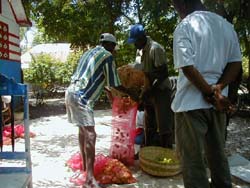You are here » Home » Telling Our Story
Case Study
Farmers use good
business and agricultural
practices to expand
market access
Farmers Increase Production and Profit

| |
Photo: DAI
|
|
Farmers package their peppers for
market.
The terms of trade now favor
small farmers, who set the
prices for Haiti’s most
important crop.
|
Challenge
Sixty-five percent of Haiti’s people live in rural areas and more than 80 percent live below the poverty line. The majority of them attempt to eke out a living farming the severely eroded steep hills that cover much of the country. Generally, farms are neither large enough nor fertile enough for successful subsistence farming, and farmers have limited access to credit, technology and markets — all contributing to low agricultural productivity.
Initiative
USAID is employing a business approach to poverty reduction, engaging participants in the improvement of their own crops. USAID has facilitated access to new markets for coffee, cacao and other products in the United States and Europe. Material printed in Kreyol, Haiti’s native language, on the characteristics of desirable produce has greatly improved product quality, and USAID has taken steps to improve crop processing technology and facilitate access to credit.
Results
In 2004, cooperatives involved in the USAID program increased their market share of total mango exports from 4 percent to 17 percent. The terms of trade now favor small farmers, who set the prices for Haiti’s most important crop; this price effect alone is estimated to have raised incomes for small mango farmers by 17 percent.
Farmers involved in the USAID program have also increased their personal investment in their crops. Private nurseries have sprung up that sell seedlings to farmers without direct USAID subsidies. Increasingly adopting agricultural practices recommended by USAID, Haitian farmers are beginning to see them-selves as producers of products — rather than harvesters of donor subsidies. This shift in mindset offers hope that these positive improvements in agriculture will become common practice with Haitian farmers.
Print-friendly version of this page (244kb - PDF)
Click here for high-res photo
Back to Top ^ | 

